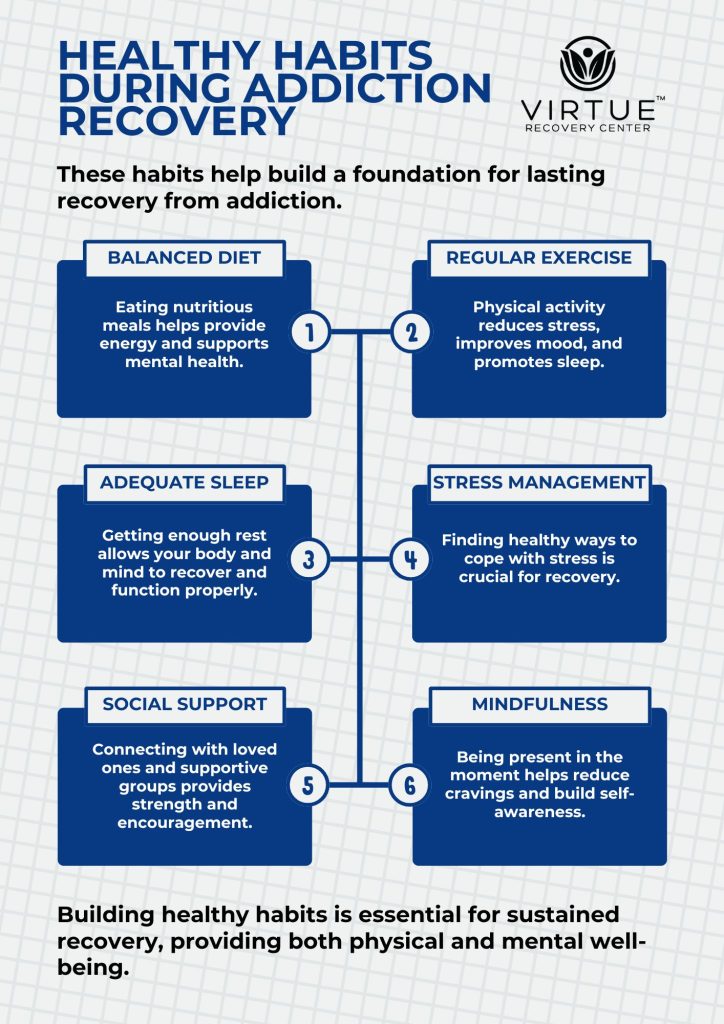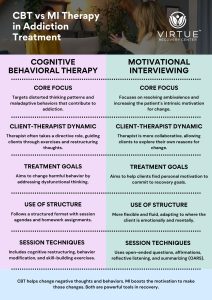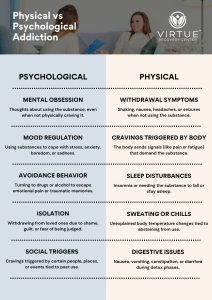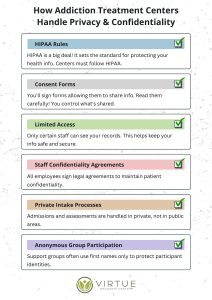Key Takeaways
- Healthy habits play a crucial role in maintaining sobriety and reducing the risk of relapse.
- Establishing a daily routine helps create stability and predictability in recovery.
- Exercise, nutrition, sleep, and mindfulness support physical and mental well-being.
- Building a strong support network helps with accountability and motivation.
- Seeking professional help ensures long-term success in overcoming addiction.
Introduction
Overcoming addiction is a major achievement, but maintaining sobriety requires commitment, structure, and a focus on well-being. Many individuals in recovery find that simply removing substances from their lives isn’t enough. Without a plan in place, the risk of relapse increases, especially when stress, boredom, or old triggers resurface. Developing healthy habits is essential to building a strong foundation for long-term recovery. These habits help stabilize, reduce cravings, and create a sense of purpose and direction. Establishing a routine that prioritizes physical health, mental well-being, and positive social connections allows individuals to reclaim control over their lives. Recovery is about more than just avoiding drugs or alcohol. It’s about learning how to thrive, developing skills to handle challenges, and creating a lifestyle that promotes happiness and stability. This article explores how to develop and maintain healthy habits that support lasting sobriety.The Importance of Healthy Habits in Recovery
Addiction often disrupts daily routines, self-care, and overall well-being. When substance use takes over, healthy activities like exercising, eating well, and getting enough sleep can fall by the wayside. Many individuals in recovery struggle with boredom, anxiety, and a lack of direction, which can make it difficult to stay on track. Healthy habits provide structure and predictability, which are crucial during recovery. Establishing a daily routine helps reduce impulsive behaviors and reinforces positive choices. When each day has a sense of order, it becomes easier to focus on progress rather than uncertainty. Beyond structure, developing habits that support mental and physical health can significantly improve mood and overall well-being. Exercise releases endorphins, which can naturally boost energy and combat depression. Nutritious meals restore the body after prolonged substance use, helping with brain function, energy levels, and emotional balance. Prioritizing rest ensures that both the body and mind can heal properly. Incorporating mindfulness into daily life can also help individuals stay present and manage stress without turning to substances. Mindfulness techniques such as deep breathing, meditation, or simply taking moments to pause and reflect can make a significant difference in maintaining emotional stability.Developing Healthy Habits for Lasting Sobriety
Creating a Structured Daily Routine
Establishing a structured routine is one of the most effective ways to maintain sobriety. When individuals wake up and go to bed simultaneously daily, plan their meals, and schedule activities, they create predictability and stability. Having a set schedule reduces the likelihood of idle time, which can lead to negative thinking or temptation. A well-structured day includes a balance of self-care, work, hobbies, exercise, and social interactions. By incorporating meaningful activities, individuals can shift their focus away from addiction and toward self-improvement and fulfillment.Prioritizing Physical Health
Taking care of the body is essential for long-term recovery. Exercise helps reduce stress, improve mood, and provide a natural energy boost. Engaging in activities like walking, yoga, or swimming can also improve sleep patterns and enhance overall physical health. Nutrition is another key factor in recovery. A well-balanced diet fuels the body, stabilizes blood sugar levels, and supports emotional well-being. Eating whole foods, staying hydrated, and avoiding processed sugars or excessive caffeine can help prevent mood swings and fatigue. Getting enough rest is just as important. Sleep is major in mental clarity, emotional regulation, and energy levels. Establishing a bedtime routine, limiting screen time before bed, and creating a calm sleeping environment can improve the quality of rest and overall recovery.Building a Strong Support Network
Addiction can be isolating, making it essential to build and maintain positive relationships during recovery. A support network provides encouragement, accountability, and a sense of belonging. Having people to turn to during difficult moments can make a significant difference in staying on the path to sobriety. Connecting with family, friends, support groups, or mentors can help individuals feel supported and understood. Recovery communities, such as 12-step programs or therapy groups, allow people to share their experiences and learn from others who are on a similar journey. Seeking professional help can also provide ongoing guidance and structured support. Therapists, counselors, and addiction specialists help individuals develop coping strategies, process emotions, and stay committed to their recovery goals.Managing Stress and Triggers
Stress is one of the most common triggers for relapse. Developing healthy coping mechanisms is crucial for handling difficult emotions without turning to substances. Engaging in activities that promote relaxation and emotional balance can help individuals navigate stress in a healthy way. Mindfulness techniques, such as breathing exercises, journaling, or meditation, allow individuals to become more aware of their thoughts and emotions. Spending time in nature, listening to music, or engaging in creative hobbies can also help reduce stress and provide an outlet for self-expression. Having a plan in place for managing triggers is essential. Identifying situations, people, or emotions that increase the risk of relapse and developing strategies to handle them can help maintain stability. Whether it’s avoiding high-risk environments, practicing self-care, or reaching out for support, being proactive can make all the difference.Including the Infographic: Healthy Habits During Addiction Recovery
Visual resources can reinforce the importance of developing and maintaining healthy habits. The following infographic outlines key habits that support long-term recovery and provide guidance for building a structured, balanced lifestyle.
Conclusion
Developing healthy habits is a vital part of maintaining sobriety and achieving long-term recovery. Establishing a structured routine, prioritizing physical and mental health, and building strong support systems all contribute to a successful recovery journey. Recovery is not just about avoiding substances—it’s about creating a life filled with purpose, self-care, and positive connections. By focusing on healthy habits, individuals can move forward with confidence and stability, knowing that they have the tools to handle challenges and maintain their progress. If you or a loved one needs addiction treatment, Virtue Recovery Las Vegas is here to help. Call 866-520-2861 today to speak with a professional and take the next step toward a healthier, substance-free life.How Can Understanding the Stages of Addiction Recovery Help in Developing Healthy Habits?
Understanding the five stages of recovery is essential for anyone seeking to develop healthy habits. This knowledge empowers individuals to recognize their progress, identify challenges, and establish healthier routines. By embracing each stage, one can foster resilience, ultimately leading to lasting positive change and a more fulfilling life.












